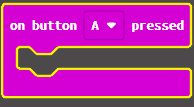In this lesson, we will carry out an interesting experiment to make a thermometer with the Micro:bit.
14.1 Components to be prepared
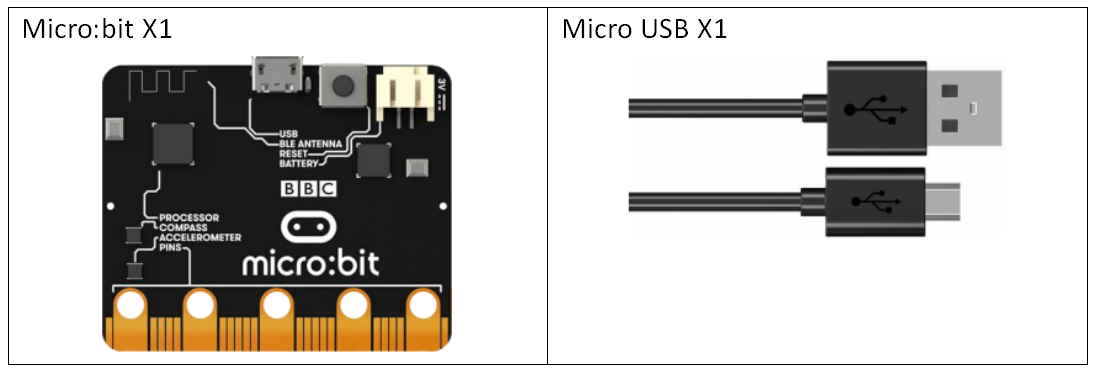
14.2 LED display
The front LED display of Micro:bit consists of 25 5x5 lattice LEDs.
25 LEDs arranged in a 5x5 grid make up the display for showing pictures, words and numbers.
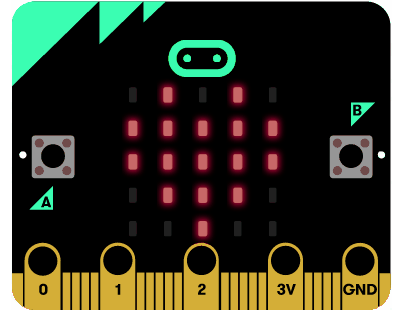
14.3 Temperature sensor
A temperature sensor is an input device that measures temperature. Your BBC micro:bit has a temperature sensor inside the processor which can give you an approximation of the air temperature. The temperature sensor is a kind of sensor that can sense (measure) temperature and convert it into usable output signal. The temperature sensor is the core part of the temperature measuring instrument. A temperature sensor is built in the chip of the Micro:bit. This temperature sensor actually measures the temperature of the chip, not the temperature of the living environment. The processor’s temperature is a fairly good approximation of the temperature around you in ℃ (Celsius).
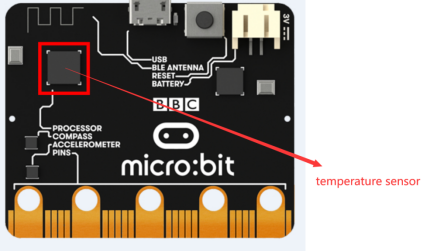
In this lesson, show how hot or cold your micro:bit is using the built-in temperature sensor.
More information about the Temperature sensor is available in the following link:
https://www.microbit.org/get-started/user-guide/features-in-depth/#temperature-sensor
14.4 Circuit
Connect micro:bit and PC with a Micro USB cable.
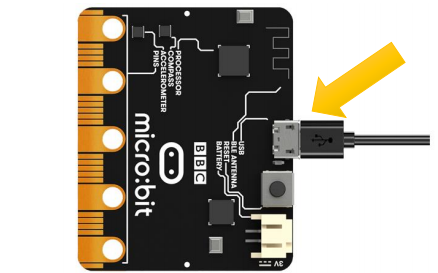
14.5 MakeCode programming
We will use an online MakeCode Editor to complete the experiment in this lesson, as shown below.
14.5.1 Start programming
(1) Log in to the website
1. You need to enter the URL in the address bar of Google Browser:
https://makecode.microbit.org/
2. After the website is successfully opened, the interface as shown below will appear:
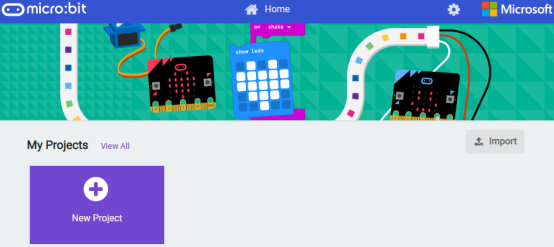
(2) Import a project
1. In the HOME interface, click the "Import" button to import the external ".hex" file:
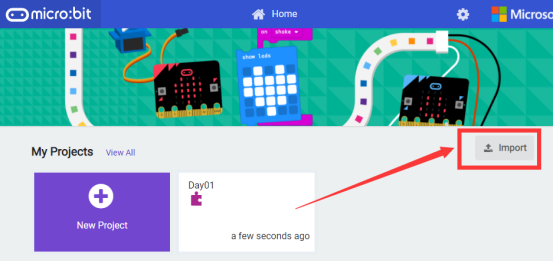
In the pop-up dialog box, select the "Import File", as shown in the following figure:
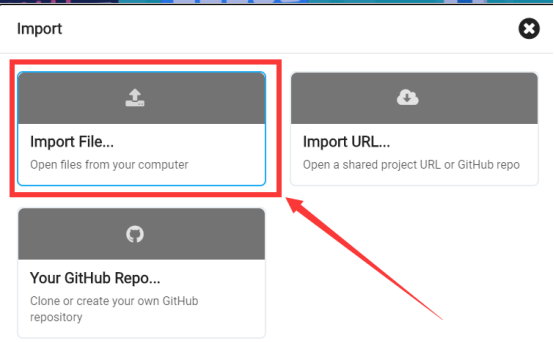
Click the "Choose File":
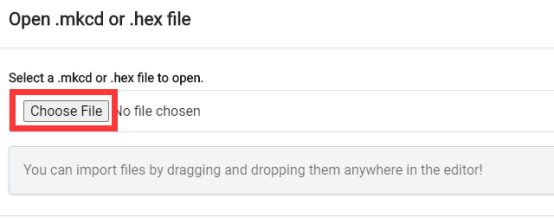
Find the code file for this lesson:
BBC_Microbit_Sensor\Code\Lesson_14\BlockCode
Select the file in ".hex" format and click the Open:
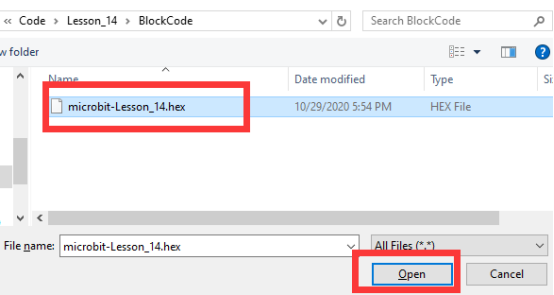
2. Notice whether the file has been loaded into the following window, and then click the "Go ahead!" button, as shown in the following figure:
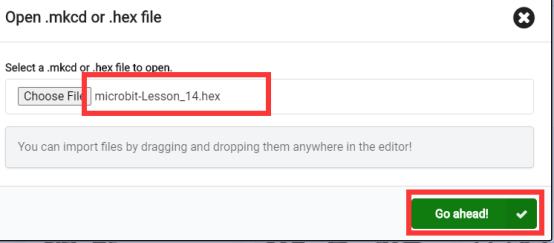
3. Open the file successfully, as shown in the following figure:
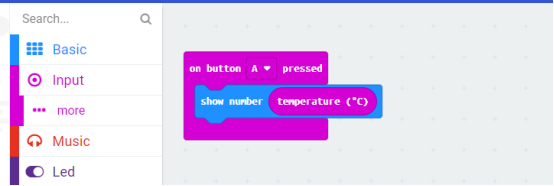
14.5.2 How it works
1.This program shows how hot or cold your micro:bit is by taking a reading from the temperature sensor in its processor or CPU (central processing unit).
2.The processor’s temperature is a fairly good approximation of the temperature around you in ℃ (Celsius).
3.In this program, when you press input button A, the micro:bit displays the processor’s current temperature on its LED display output.
4.Take the micro:bit into warmer and colder places and see how the temperature readings change.
14.5.3 Run the program
1. After the program is written, connect micro:bit and PC with a Micro USB cable.
2. After micro:bit is connected to the computer, you need to first "Pair device". Click the  button on the right of
button on the right of  in the lower left corner, and then click the
in the lower left corner, and then click the  option, as shown in the following figure:
option, as shown in the following figure:

Then click  in the lower right corner:
in the lower right corner:
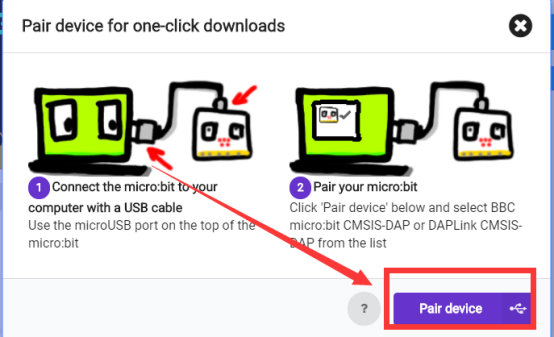
Then the following dialog box will pop up, select  , and then click
, and then click 
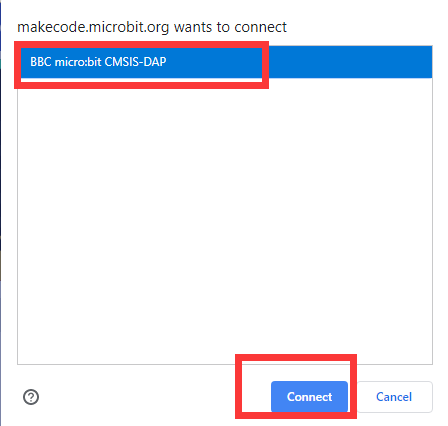
After the device is successfully paired, the  button changes to
button changes to 

3. Start to download the program to Micro:bit, and click the  button. Generally, the program will be downloaded directly to the Micro:bit. After the download is completed, your Micro:bit will restart and run the program just downloaded.Press the button A. And the LED screen of the Micro:bit will display the temperature, as shown in the following figure:
button. Generally, the program will be downloaded directly to the Micro:bit. After the download is completed, your Micro:bit will restart and run the program just downloaded.Press the button A. And the LED screen of the Micro:bit will display the temperature, as shown in the following figure:
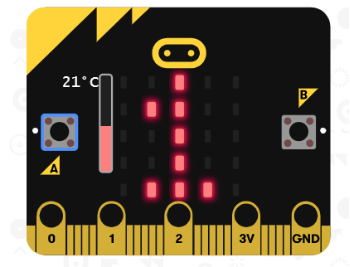
[Note]:
If Micro:bit doesn't respond after clicking the  , you need to click the
, you need to click the  button on the right of the
button on the right of the  , and then click the
, and then click the  , and observe the situation of the Micro:bit again, as shown in the following figure:
, and observe the situation of the Micro:bit again, as shown in the following figure:

If you have problems, please send us an email: support@adeept.com
14.5.4 Learn the code program
In the program, we use the following instruction blocks, which are explained as follows:
Block | Function |
| This is an instruction block to detect the temperature. |
| This is an instruction block to control the button. |
14.6 Python programming
14.6.1 Run the program
1.Connect micro:bit and PC with a Micro USB cable.
2. Open the Mu Editor installed on the computer, and click the button [Load] in the upper left corner to open the source code program of this lesson:

Find the code file for this lesson:
BBC_Microbit_Sensor\Code\Lesson_14\PythonCode
Select the file in ".py" format and click the Open:

3. Click the [Flash] button to download the program to Micro:bit, as shown in the following figure:
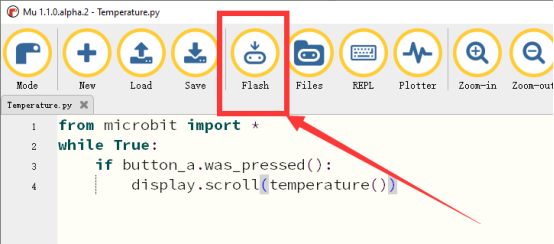
4.After the program is downloaded, your Micro:bit will restart and run the program you just downloaded. Press the button A. And the LED screen of the Micro:bit will display the temperature, as shown in the following figure:
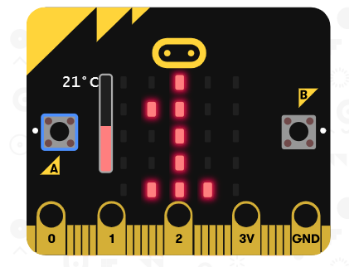
14.6.2 How it works
1.This program shows how hot or cold your micro:bit is by taking a reading from the temperature sensor in its processor or CPU (central processing unit).
2.The processor’s temperature is a fairly good approximation of the temperature around you in ℃ (Celsius).
3.In this program, when you press input button A, the micro:bit displays the processor’s current temperature on its LED display output.
4.Take the micro:bit into warmer and colder places and see how the temperature readings change.
【Note】:
After you click the [Flash] button, if there is no change on the LED screen of Micro:bit, you need to restart the Micro:bit, and then click the [Flash] button again.
If you have problems, please send us an email: support@adeept.com
14.6.3 Learn the code program
The source codes are as follows:
1 2 3 4 | from microbit import * while True: if button_a.was_pressed(): display.scroll(temperature()) |
(1)temperature():Return the temperature of the micro:bit in degrees Celcius.
4 | display.scroll(temperature()) |

